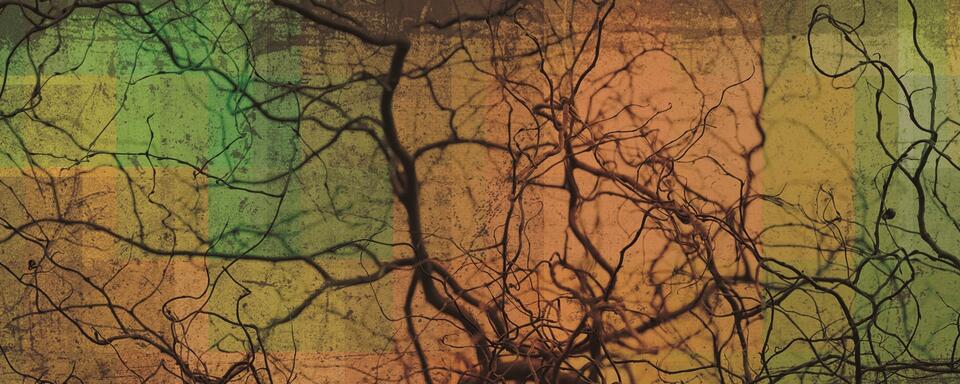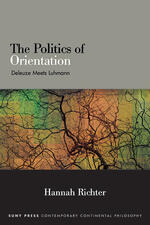
‘It’s complexity, stupid’: Reading Luhmann and Deleuze in Right-wing Populist Times
Guest post by Hannah Richter, author of the new book, The Politics of Orientation, which is available now.
Imagine a world in which everything is possible. From moment to moment, the borders we draw, the identities we adopt, what we condemn and what we endorse can change. Some might consider this a utopian prospect. In such a world, we could once and for all leave behind the historical injustices that haunt our societies, be it colonialism, the oppression of women or the thoughtless extraction of natural resources. For others, such a world would be a dystopia that plunges people into radical uncertainty. Without at least somewhat stable boundaries, we have no way of making sense of the world we inhabit. Proponents of this view might be compelled to add that recent political upheavals, from the rise of a new authoritarian right fuelled by misinformation to an ever more polarised public discourse, have given us a taste of precisely how dangerous a world in flux can be. At the intersection of both perspectives, Gilles Deleuze and Niklas Luhmann meet. And it is here that the relevance of reading Deleuze and Luhmann together in the political present lies.
Mentioning Luhmann and Deleuze together seems like the set-up for a graduate student joke: “A systems theorist and a French poststructuralist walk into a bar …”. The German sociologist, infamous for his aloof dryness, and the flamboyant, politically activist French philosopher make for a comically unlikely pairing. However, the reception of Luhmann’s work exaggerates his distance from post-structuralist scholarship. If at all, Luhmann is know today as an example of outdated sociological structuralism. Spearheaded by Talcott Parsons, it drastically overestimated the orderliness and rigidity of social life. But, to use an image from Deleuze’s philosophy, the technocratic fantasist of absolute systemic order is only one of several Luhmanns. Present in his work is also the humorous Luhmann, who sprinkles his writings with little, subversive jokes. There is Luhmann, the engaged reader of Continental Theory. He draws inspiration Leibniz, Nietzsche and Marx. And he opens his Theory of Society with an epigraph from Spinoza, the philosopher of joyful creation whose impact on Deleuze is so profound. Finally, there is Luhmann, the curious observer of philosophy’s post-structuralist turn, who debated Drucilla Cornell and referenced Jacques Derrida, Michel Serres – and Gilles Deleuze.
As a graduate student, the few footnotes that betrayed Luhmann’s interest in Deleuze’s work gave me pause. In the space of possibility opened-up by this pause, my book on Deleuze and Luhmann was written many years later. From the beginning, this book was intended to tell not one but two stories. One is philosophical, the other is political. The philosophical story is a journey through the rabbit hole of reading the theories of Deleuze and Luhmann together. It is anchored in their shared theories of sense. For Luhmann and Deleuze, sense is the fabric that weaves the worlds we inhabit. We might think of Remedois Varo’s painting “Embroidering the Earth’s Mantle”,[1] but without a dark overseer dictating the patterns to be woven. The shapes imposed on identities and societies are made from the very same fabric that makes worlds in sense. Underneath it all, sense always remains open. The canon of social theory depicts Deleuze as the thinker of creative chaos. Luhmann, on the contrary, is the theorist of systemic order that defies complexity. But both are in fact analysts of their interplay.
Chaotic openness is always both utopian prospect for change and dystopian threat. In its pure form, subjects and societies cannot cope with unordered chaos. Deleuze and Luhmann tell the story of how we utilise ideas, values, historical timelines and political rule to conceal the terrifying openness of sense. But is always seeps through the cracks of common knowledge and social order. As a political theorist, I am committed to providing tools that help us understand and critique the political present we live in. For me, the philosophical story of Deleuze and Luhmann is only worth telling because it comes with a political counterpart. If we need Deleuze’s philosophical prowess for Luhmann’s social theory to unfold its full potential, it is Luhmann who teaches Deleuze political analysis.
The critical scholarship that tries to understand 21st century democracy is rife with diagnoses of exceptions. Governments, the argument goes, have long lost all genuine shaping-power to global markets, party politics and the will of an increasingly individualised electorate. All they have left to prove their power is the make-believe of governmental force in the face of whatever the crisis of the day is. The political question I was grappling with throughout the journey of writing this book is what this focus on events, single-issue responses and problem-diagnoses reveals about the way contemporary politics works. I was interested not just in how governments seek to showcase their public usefulness. I also wanted to know why citizens were happy to invest legitimacy in what was being offered to them. Deleuze and Luhmann give an intriguing answer: in the chaotic present, politics functions by reducing complexity and offering orientation to citizens.
The present is certainly not the first time that modern societies are conscious of their own complexity. The trope that technology, transportation and science have made the world ominously boundless is a staple of early 20th century art and literature. In the 21st century, globalisation and the break-down of long-standing boundaries including East/West and nature/society have heightened the sense that we live in threateningly complex times. This perception creates a public demand for orientation that is mapped onto democratic governments. The, as Deleuze and Guattari call it, “post-mortem despotism” of the State might only have limited power to steer socio-economic developments. But it can govern openness in sense. Understood with Deleuze and Luhmann, the institutions and actors of Western democracy retain their political legitimacy by guiding sense-making. Politics governs not through action but through orientation. This politics of orientation allows us to understand the present success of a new authoritarian right that mobilises conspiracy theories, vitriolic sexism, xenophobia and homophobia. Their simple answers provide effective complexity-reduction. This makes the new right particularly appealing as a politics that offers guidance for sense-making, not solutions.
Hannah Richter is Lecturer in Politics at the University of Sussex, where she teaches political theory. She is the author of Challenging Anthropocene Ontology: Modernity, Ecology and Indigenous Complexities (forthcoming) and the editor of Biopolitical Governance. Race, Gender, Economy.


